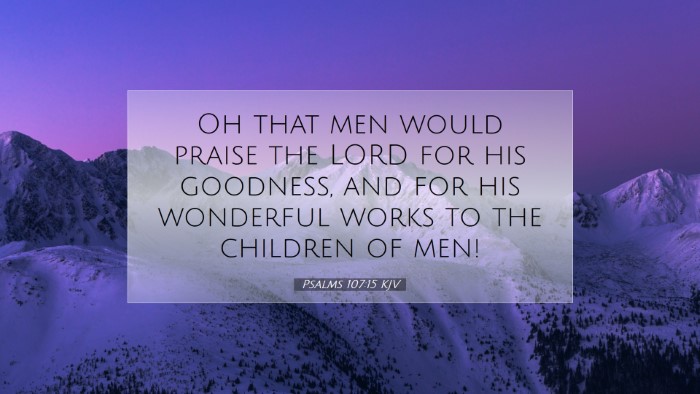Psalms 107:15
"Oh that men would praise the Lord for his goodness, and for his wonderful works to the children of men!"
Introduction
The verse Psalms 107:15 encapsulates a profound response to God's mercies and works among mankind. This expression of praise is fundamental within the Psalms as the psalmist calls upon the faithful to acknowledge God's goodness and His magnificent deeds. The insights gathered from renowned public domain commentaries illuminate the theological significance of this verse, encouraging deeper reflections suitable for pastors, scholars, and believers alike.
Understanding the Context
The context of Psalm 107 is vital to appreciating verse 15. The psalm begins by calling upon the redeemed of the Lord to give thanks (Psalm 107:1). It recounts various experiences of distress and deliverance, highlighting God’s willingness to provide salvation and mercy. The verse in question arises within a theme of testimony, urging recognition of God's character and acts.
-
The theme of praise:
The psalmist emphasizes the importance of praise as a response to divine intervention, reflecting a central tenet of Hebrew worship where gratitude and acknowledgment of God’s sovereignty are paramount.
-
The nature of God's goodness:
God's goodness here encompasses both His attributes and His actions. It urges believers to reflect on the benevolence that permeates divine involvement in human affairs.
Insights from Commentaries
Matthew Henry's Commentary
Matthew Henry elaborates on the notion that praise is not a mere suggestion but a necessary duty of man, reflecting a response to God’s grace. He points out that God's "wonderful works" are particularly significant as they demonstrate His power and mercy towards the children of men.
-
The call to praise:
Henry highlights that the psalmist's exhortation encourages not only individual worship but communal acknowledgment of God's goodness. He stresses that the acknowledgment should be active and continuous.
-
Reflection on personal experience:
Henry encourages believers to recount their experiences of deliverance and mercy, leading them to a place of genuine gratitude and praise.
Albert Barnes' Notes on the Bible
Albert Barnes emphasizes the relational aspect of this verse, noting that praise is both a privilege and a responsibility of the recipients of God’s goodness. This verse serves as a reminder of the obligation of those who have experienced God's grace to share that testimony.
-
Expression of gratitude:
Barnes points out that genuine praise arises from an acknowledgment of God’s "wonderful works"—the miracles in everyday life which often go unnoticed.
-
Challenge to believers:
He notes that the verse serves as a challenge to the faithful to cultivate a spirit of thankfulness and to foster a culture of praise within their communities.
Adam Clarke's Commentary
Adam Clarke examines the term "wonderful works," suggesting it encompasses both the miraculous and the profound acts of God through history. He underscores that the psalmist's appeal also highlights the contrast between God's faithfulness and human ingratitude.
-
Historical perspective:
Clarke encourages the reader to view this verse through a historical lens, contemplating the mighty acts of God throughout salvation history which warrant remembrance and praise.
-
Human response:
He critiques the recurring theme of human forgetfulness in spiritual matters and urges believers to remain vigilant in recognizing and celebrating God’s faithfulness.
Theological Reflections
Reflecting on Psalms 107:15 draws out several key theological implications pertinent to the Christian faith:
-
The Nature of God:
This verse affirms the goodness of God, an attribute that defines His relationship with humanity. The recognition of God's benevolence leads to the act of worship, a vital part of human response.
-
The Role of Testimony:
Praising God for His "wonderful works" serves not only as individual devotion but as corporate testimony—encouraging others in their faith journeys.
-
The Urgency of Praise:
The psalmist’s cry reflects an urgency for believers to actively engage in thanksgiving, modeling the joy and hope that arises from a life attuned to God’s works.
Application for Today
In practical terms, how can contemporary believers apply the truths found in Psalms 107:15? The following applications emerge clearly:
-
Cultivate a spirit of gratitude:
Believers are encouraged to start a habit of daily thanksgiving, recognizing God's involvement in their lives and the lives of others.
-
Share testimonies:
Creating spaces for sharing testimonies in congregational settings can strengthen community bonds and uplift those experiencing trials.
-
Encourage worship practice:
Include praise in both personal devotion and congregational worship as a natural response to God’s goodness and mercy.
Conclusion
Psalms 107:15 serves as a powerful reminder of the responses elicited by the goodness and works of the Lord. As articulated by the insights of Matthew Henry, Albert Barnes, and Adam Clarke, believers are called to an active engagement of praise, shaped by remembrance and testimony of God’s interventions. This understanding not only enriches individual faith but also strengthens communal worship, fostering a culture that embodies gratitude, recognition, and celebration of God’s everlasting goodness.


